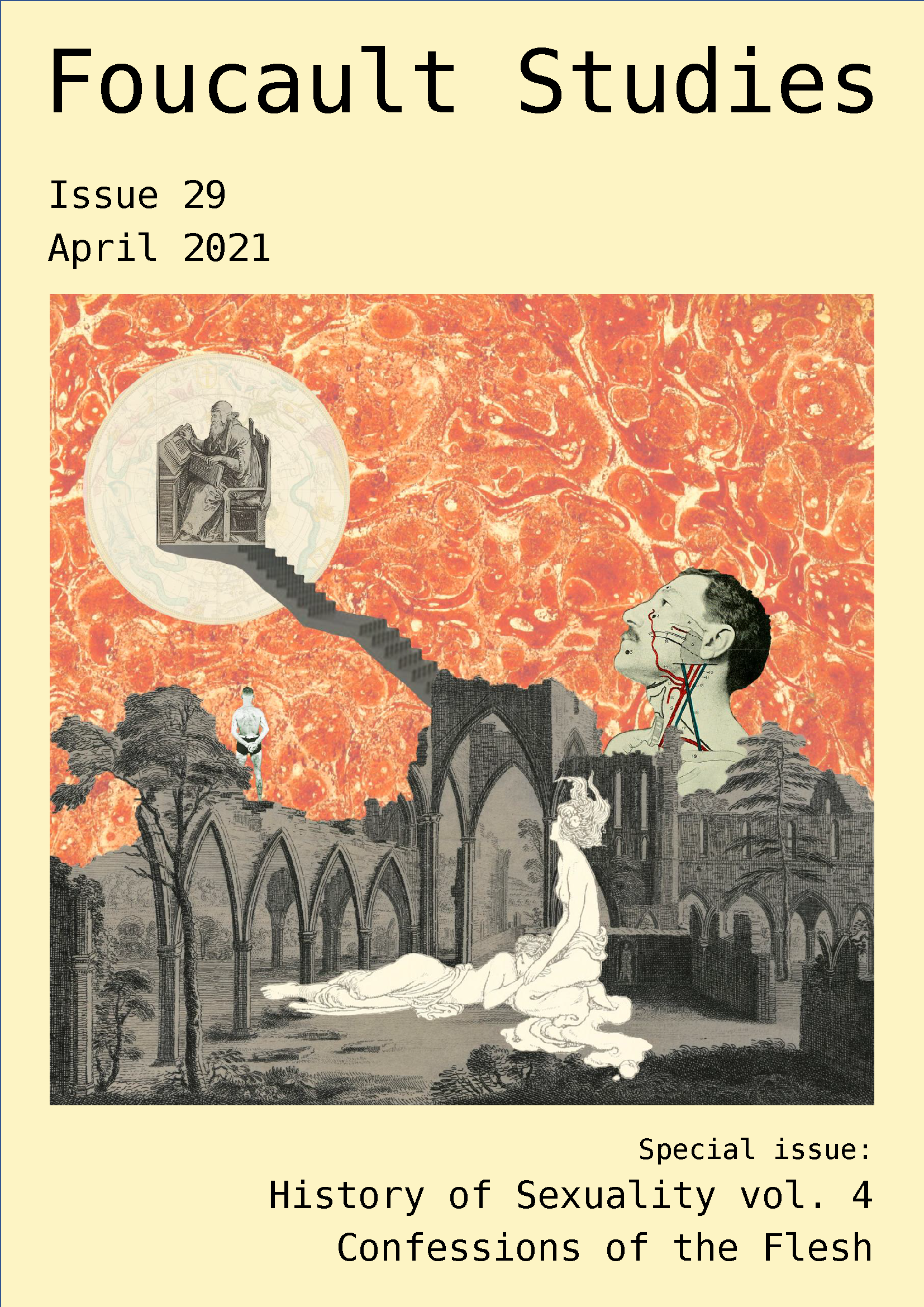Foucault’s Queer Virgins: An Unfinished History in Fragments
DOI :
https://doi.org/10.22439/fs.vi29.6212Mots-clés :
Virginity, Confession, Christianity, Counter-conduct, Sexuality, EthopoiesisRésumé
This essay attends to the place of virginity at the center of the fourth volume of Michel Foucault’s History of Sexuality, Confessions of the Flesh. Reading virginity through a rhetorical lens, the essay argues for an ethics and a politics of counter-conduct in Foucault characterized by chiasmus, a rhetorical structure of inverted parallelism. That chiastic structure frames Foucault’s Confessions, and all of his work, as a fragmented, self-hollowing speech haunted by death and the dissolution of the subject. The essay reads Foucault as apophatic speech that returns to us, no longer itself, made strange. In that deathly movement of eternal recurrence, Foucault’s Confessions speak after death from the x’d out place of the queer virgin: on a threshold that separates life from death, in a movement of metanoia or ethical conversion. As an unfinished history in fragments, the essay’s form brings attention to incompletion as a crucial aspect of Foucault’s work. The fragmentation that characterizes an unfinished history underscores poetic discontinuity as the hallmark of Foucault’s genealogical method and thought.
Références
Althaus-Reid, Marcella, The Queer God. New York: Routledge, 2003.
Carson, Anne, If Not, Winter: Fragments of Sappho. New York: Random House, 2002.
Castelli, Elizabeth, “Virginity and Its Meaning for Women’s Sexuality in Early Christianity,” Journal of Feminist Studies in Religion 2:1 (1986), 61-88.
Dällenbach, Lucien, The Mirror in the Text. Chicago: University of Chicago Press, 1989.
Davidson Arnold, “In Praise of Counter-Conduct,” History of the Human Sciences 24:4 (2011), 25-41.
Deleuze, Gilles, Course on Foucault [1985-86]. La voix de Gilles Deleuze en ligne, Université de Paris 8. http://www2.univ-paris8.fr/deleuze/article.php3?id_article=403
Dickmann, Iddo, The Little Crystalline Seed: The Ontological Significance of Mise en Abyme in Post-Heideggerian Thought. New York: SUNY Press, 2019.
Foucault, Michel, Abnormal: Lectures at the Collège de France 1974-1975. New York: Picador, 2003.
Foucault, Michel, “Different Spaces,” in Essential Works of Foucault, 1954-1984, Vol. 2, ed. Paul Rabinow, 175-186. New York: New Press, 1998.
Foucault, Michel, Discipline and Punish: The Birth of the Prison. New York: Vintage, 1995.
Foucault, Michel, “Entretien avec Roger-Pol Droit,” 9 cassettes. Paris: IMEC, June 1975.
Foucault, Michel, “Friendship as a Way of Life,” in Essential Works of Foucault, 1954-1984, Vol. 1, ed. Paul Rabinow, 135-140. New York: New Press, 1997.
Foucault, Michel, History of Madness. London: Routledge, 2006.
Foucault, Michel, History of Sexuality Vol. 1: An Introduction. New York: Vintage, 1990.
Foucault, Michel, History of Sexuality Vol. 4: Confessions of the Flesh. New York: Pantheon Books, 2021.
Foucault, Michel, Histoire de la sexualité Vol. 4: Les Aveux de la chair. Paris: Gallimard, 2018.
Foucault, Michel, Les Mots et les choses. Une archéologie des sciences humaines. Paris: Gallimard, 1966.
Foucault, Michel, “Nietzsche, Genealogy, History,” in Essential Works of Foucault, 1954-1984, Vol. 2, ed. Paul Rabinow, 369-392. New York: New Press, 1998.
Foucault, Michel, Security, Territory, Population: Lectures at the Collège de France, 1977-1978. New York: Palgrave Macmillan, 2007.
Foucault, Michel, Speech Begins after Death, ed. Philippe Artières. Minneapolis: University of Minnesota Press, 2013.
Foucault, Michel, “The Discourse on Language,” in The Archeology of Knowledge and the Discourse on Language, 215-237. New York: Random House, 1972.
Foucault, Michel, The Order of Things. New York: Vintage, 1994.
Foucault, Michel, “The Thought of the Outside,” in Essential Works of Foucault, 1954-1984, Vol. 2, ed. Paul Rabinow, 147-170. New York: New Press, 1998.
Harcourt, Bernard E., “Contre-/Counter-,” in Thinking with Balibar: A Lexicon of Conceptual Practice, ed. Laura Ann Stoler, Stathis Gourgouris and Jacques Lezra, 71-84. New York: Fordham University Press, 2020. https://doi.org/10.5422/fordham/9780823288519.003.0006
Huffer, Lynne, Foucault’s Strange Eros. New York: Columbia University Press, 2020.
Jordan, Mark, Convulsing Bodies: Religion and Resistance in Foucault. Stanford: Stanford University Press, 2015.
McGushin, Edward, Foucault’s Askesis: An Introduction to the Philosophical Life. Evanston: Northwestern University Press, 2007.
Revel, Judith, Foucault, Une pensée du discontinu. Paris: Mille et une nuits, 2010.
Tonstad, Linn Marie, Queer Theology. Eugene, OR: Cascade Books, 2018.
Téléchargements
Publié-e
Comment citer
Numéro
Rubrique
Licence
Authors retain copyright to their work, but assign the right of the first publication to Foucault Studies. The work is subject to a CC BY-NC-ND 4.0 license, but despite these restrictions, authors can take for granted that Foucault Studies will permit articles published in Foucault Studies to be translated or reprinted in another format such as a book providing a full reference is made to Foucault Studies as the original place of publication.



